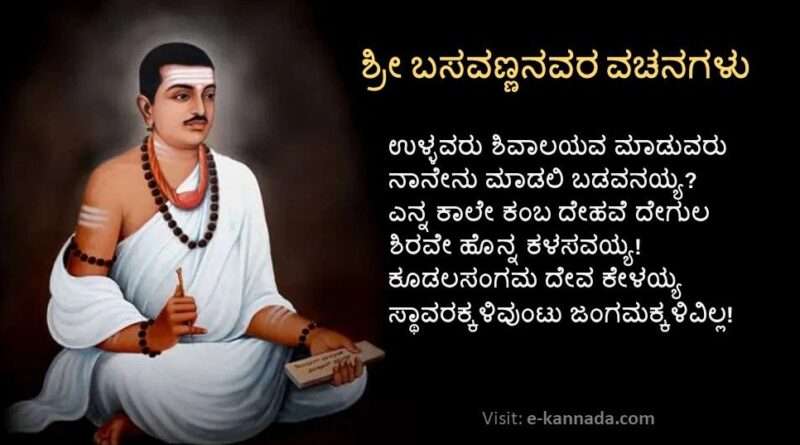Basavanna Vachana
Basavanna, also known as Basaveshwara, was a revered philosopher, poet, and social reformer who lived in 12th-century Karnataka, India. His teachings and compositions, known as Vachanas, continue to resonate with people seeking spiritual enlightenment and social justice. Basavanna’s Vachanas emphasize equality, devotion, and the rejection of caste-based discrimination.
Let us delve into the profound wisdom encapsulated in Basavanna’s Vachanas and explore their enduring relevance.
| Full Name | Basavanna (also known as Basaveshwara) |
| Birth Date | 1105 CE |
| Birthplace | Bagevadi, Bijapur District, Karnataka, India |
| Death Date | 1167 CE |
| Profession | Philosopher, Poet, Social Reformer |
| Place of Activity | 12th-century Karnataka, India |
| Major Contributions | – Composed Vachanas, devotional poetry in Kannada, promoting spiritual and social equality and justice. |
| Notable Teachings | – Emphasis on equality, devotion, and rejection of caste-based discrimination. |
| Legacy | – Considered a pioneer of the Lingayat sect in Hinduism. |
| – Influential in shaping Karnataka’s cultural and spiritual landscape. | |
| – His teachings continue to inspire social reform and spiritual seekers. | |
| Major Works | – Vachanas (devotional compositions) |
| Key Beliefs | – Monotheism |
| – Rejecting rituals and idol worship | |
| – Promoting inner devotion and direct connection with the divine. | |
| Relevance Today | – Basavanna’s teachings on equality and social justice remain pertinent in contemporary discussions on human rights and social reform. |
| – His Vachanas continue to be studied and revered by followers of Lingayatism and those interested in spiritual enlightenment. |
Basavanna: A Social Reformer Ahead of His Time
Basavanna’s time was marked by social inequality, caste-based discrimination, and rigid social hierarchies. In such a context, Basavanna emerged as a beacon of hope, challenging the prevailing norms and advocating for equality and social justice. He believed in the inherent worth and equality of all individuals, irrespective of their caste, class, or gender.
Here is a translation of one of Basavanna’s famous Vachanas:
“In the world of Lingayats, There is no high or low, no difference, Of those who wear the linga, And those who do not. There is no distinction, Of caste or birth, Of men and women, Of rich and poor.
The linga is a symbol, Of the formless divine, The embodiment of unity, And the source of all existence. Let us discard the trappings of society, The chains of tradition, And embrace the linga within, To find true liberation.
In the eyes of God, All are equal, No one is superior, And no one is inferior. Let us build a society, Based on love and compassion, Where everyone is treated, With dignity and respect.
Let us abandon rituals and dogmas, And focus on inner purity, On devotion, and self-realization, For that is the true path. In the world of Basavanna, There is only one caste, The caste of devotion, And the linga is our guide.”
Equality and Social Justice in Basavanna Vachanas
Basavanna’s Vachanas resound with the call for equality and social justice. He vehemently rejected the notion of social superiority based on birth or caste. In his Vachanas, Basavanna emphasizes that in the world of Lingayats, there is no distinction between those who wear the linga (a symbol of devotion) and those who do not. He believed that the linga is a unifying symbol, transcending all external markers of identity. Basavanna called for the eradication of caste-based discrimination and the creation of a society where every individual is treated with dignity and respect.
Basavanna’s teachings on equality extend beyond the realm of caste to encompass gender equality as well. He rejected the idea that women are inferior and advocated for their equal participation in spiritual and social spheres. Basavanna’s Vachanas provide a strong foundation for the empowerment of women and the dismantling of gender-based discrimination.
Devotion and Spiritual Liberation
Central to Basavanna’s teachings is the significance of devotion and self-realization. He believed that true liberation lies in recognizing the divine presence within oneself. In his Vachanas, Basavanna urges individuals to transcend external rituals and dogmas and instead focus on inner purity and the path of devotion. The linga, according to Basavanna, is not merely an object of worship; it symbolizes the embodiment of unity and serves as a guiding force in the pursuit of spiritual enlightenment.
Basavanna’s emphasis on devotion highlights the essence of a personal and intimate connection with the divine. He encouraged individuals to cultivate a deep sense of devotion and to find their own unique paths to spiritual realization. Basavanna’s teachings inspire seekers to look beyond the external trappings of religion and connect with the divine essence that resides within.
Basavanna Vision for a Harmonious Society
Basavanna envisioned a society founded on love, compassion, and mutual respect. He challenged the divisions created by societal norms and sought to unite people through the common thread of devotion.
In his Vachanas, Basavanna emphasizes that the linga does not discriminate based on caste, class, or gender. He called for the dissolution of social barriers and the cultivation of a society where every person is recognized as equal.
Basavanna’s teachings emphasize the importance of practicing love and compassion towards all beings. He encouraged individuals to extend their love beyond their immediate circles and embrace all of humanity.
Basavanna’s vision for a harmonious society resonates with the principles of social justice and inclusivity, creating a blueprint for building a world that transcends divisions and fosters unity.
The Enduring Impact of Basavanna Vachanas
Even centuries after his time, Basavanna’s Vachanas continue to inspire and guide individuals in their spiritual and social journeys. His profound wisdom, captured in his poetic compositions, has left an indelible mark on Karnataka’s cultural and social fabric. Basavanna’s teachings have played a pivotal role in fostering inclusivity, equality, and social harmony, serving as a beacon of light for generations seeking a more just and compassionate society.
Basavanna’s Vachanas have had a profound impact on the people of Karnataka and beyond. His teachings resonated with the marginalized and oppressed communities, giving them a voice and instilling in them a sense of self-worth and dignity. Basavanna’s Vachanas became a powerful tool for social reform, challenging the existing power structures and advocating for equality and justice.
One of the key aspects of Basavanna’s teachings was the rejection of caste-based discrimination. He emphasized that true devotion and spirituality are not contingent upon one’s caste or birth. Basavanna’s teachings challenged the deeply ingrained prejudices and biases of society, urging people to see beyond external labels and recognize the inherent divinity in every individual. This message of equality and inclusivity struck a chord with people across various castes and classes, inspiring them to come together and forge a more egalitarian society.
Basavanna’s teachings on gender equality were also revolutionary for his time. He recognized the immense potential of women and believed in their equal participation in all aspects of life. His Vachanas celebrated the strength, wisdom, and devotion of women, elevating their status and demanding their rightful place in society. Basavanna’s teachings on gender equality continue to be relevant today, as societies worldwide strive for gender parity and empowerment.
Conclusion
Basavanna’s Vachanas were not limited to social reform; they also provided profound insights into the nature of spirituality and the path to self-realization. He emphasized the importance of inner purity, devotion, and surrender to the divine. Basavanna encouraged individuals to seek the divine within themselves and to cultivate a personal connection with the divine essence. His teachings rejected the idea of religious formalities and rituals, emphasizing the primacy of genuine devotion and spiritual practice.
The enduring impact of Basavanna’s Vachanas can be seen in various spheres of society. Lingayatism, the religious and social movement inspired by Basavanna’s teachings, continues to thrive, promoting the values of equality, compassion, and devotion. The Lingayat community, deeply influenced by Basavanna’s philosophy, has played a significant role in shaping Karnataka’s cultural and social landscape. Basavanna’s teachings have also transcended regional boundaries, attracting followers and admirers from different backgrounds, who have been inspired by his message of social justice and spirituality.
Today, Basavanna’s Vachanas are widely studied, recited, and revered. They are a testament to the power of poetry and language to convey profound philosophical ideas. Basavanna’s poetic expressions, infused with deep spiritual insight and social consciousness, continue to touch the hearts and minds of people, serving as a source of inspiration, introspection, and transformation.
In conclusion, Basavanna’s Vachanas represent a poetic treasure trove of wisdom, encompassing the principles of equality, social justice, and devotion. His teachings continue to inspire individuals to challenge social inequalities, embrace spirituality, and strive for a more inclusive and compassionate society. Basavanna’s legacy lives on in the hearts of those who seek truth, justice, and enlightenment, carrying forward his vision of a world where every individual is recognized as equal and where devotion and love transcend all barriers.
Thank You!
FAQs
Who was Basavanna, and what were his major contributions?
Basavanna, also known as Basaveshwara, was a revered philosopher, poet, and social reformer who lived in 12th-century Karnataka, India. His major contributions include composing Vachanas (devotional poetry), which emphasized equality, devotion, and the rejection of caste-based discrimination.
What were the key beliefs and teachings of Basavanna?
Basavanna’s key beliefs included monotheism, rejecting rituals and idol worship, and promoting inner devotion and a direct connection with the divine. His teachings emphasized equality and the rejection of caste-based discrimination.
Related Links:

